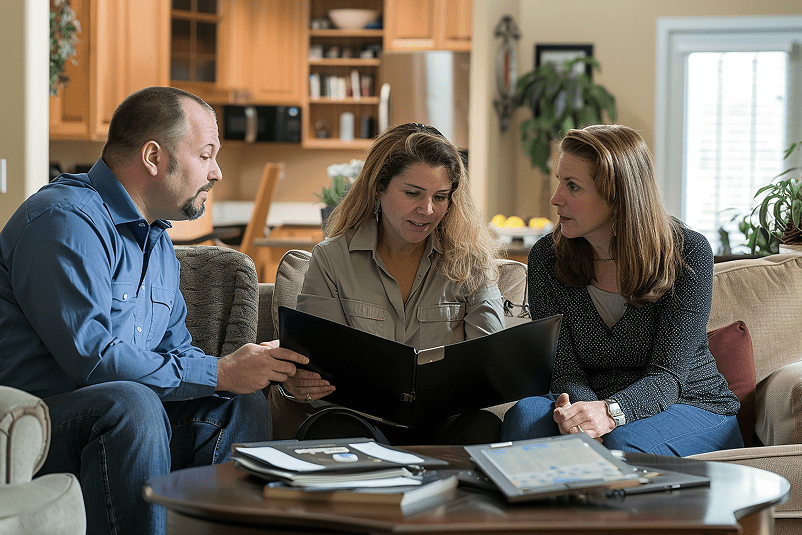Getting a Mortgage With a County Court Judgement (CCJ)
Having a County Court Judgment (CCJ) on your credit file can lead you to believe that getting a mortgage is out of the question. But even if you have a CCJ, it doesn’t mean that you can never take out a mortgage. High street lenders typically reject applications from borrowers with CCJs, but specialist mortgage lenders may be willing to lend if you have a CCJ, subject to the details of the CCJ and your financial situation.
Understanding the application process is crucial, and a mortgage broker can play a significant role in navigating it effectively.
In this article, we will discuss how satisfied and unsatisfied CCJs affect your mortgage application, what lenders will look out for, and which lenders are more willing to offer mortgages to applicants with CCJs.
Introduction to CCJs
A County Court Judgment (CCJ) is a court order that can be issued against an individual who fails to repay a debt. This court order can have a significant impact on your credit file and your ability to obtain a mortgage. Understanding what a CCJ is and how it affects mortgage applications is crucial for those looking to get a mortgage with a CCJ.
Specialist lenders and mortgage brokers can help individuals with CCJs navigate the mortgage process and find suitable lenders. These professionals have the expertise to match you with lenders who are more willing to consider applicants with a CCJ, increasing your chances of securing a mortgage.
What Is a County Court Judgment (CCJ)?
A CCJ is a court order that can be issued if you fail to repay a debt. A County Court Judgment (CCJ) is a court order issued after failing to repay money owed. It remains on your credit report for six years from the date it was issued, which can significantly lower your credit score and affect your ability to obtain credit.
However, you can still qualify for a mortgage with a CCJ, especially if the judgment has been satisfied. Some high street lenders and specialist lenders could potentially still lend. This will be down to underwriter’s discretion.
Understanding Credit Files
A credit file, also known as a credit report, contains detailed information about your credit history, including any CCJs, missed payments, and outstanding debt. Credit reference agencies, such as Checkmyfile, Experian, Equifax, and TransUnion.
Maintaining these files and provide them to lenders to help assess your creditworthiness. A good credit report is essential for getting a mortgage. Individuals with CCJs may need to work on improving their credit score to increase their chances of approval. Regularly reviewing your credit report, addressing any errors, and taking steps to improve your credit history can make a significant difference when applying for a mortgage.
How a credit commitment typically turns into a county court judgement (CCJ)
This only happens after a series of missed or late payments and when all other attempts to recover the debt have failed.
Here’s the typical process:
Missed Payments – Usually, after 3 to 6 missed payments, the lender may issue a default notice, which is a formal warning that you’re breaching your credit agreement.
Default Registered – If the missed payments aren’t resolved, a default is recorded on your credit file and the lender can then begin legal proceedings.
Court Action Begins – If the debt remains unpaid, the lender may apply to the County Court for a judgment. You’ll receive a claim form and have 14 days to respond or settle.
CCJ Issued – If you don’t respond or fail to make payment arrangements, the court may issue a CCJ.
So, it’s not a fixed number of late payments, but rather a process that begins with missed payments and escalates if no action is taken. Acting early and communicating with lenders can often prevent the situation from reaching the CCJ stage.
How Does a CCJ Affect Getting a Mortgage?
A County Court Judgment (CCJ) can significantly affect your ability to get a mortgage, especially with high street lenders, who often view CCJs as a major red flag. A CCJ stays on your credit file for six years, impacting your credit score and making lenders see you as higher risk.
However, getting a mortgage with a CCJ is still possible particularly through specialist mortgage lenders who consider applicants with bad credit. The impact of a CCJ depends on factors such as how recent it was, whether it has been satisfied, the amount owed, and how many CCJs appear on your file. If your CCJ was satisfied and occurred over 2–3 years ago, some lenders may still offer competitive deals, especially if you have a larger deposit and strong current affordability.
Working with a bad credit mortgage broker can help match you with potential lenders who specialise in mortgages with CCJs, improving your chances of approval for the right mortgage based on your circumstances.
Satisfied CCJ
A satisfied CCJ means that you’ve paid the debt in full. Once a CCJ is satisfied, it will still appear on your credit record for six years, but it will show that the debt has been paid off. A CCJ that is satisfied can help (particularly if it has been satisfied for more than 12 months). As a result, this step proves to lenders that you have responsible financial behaviour, and it increases your chances of having your application accepted.
Unsatisfied CCJ
An unsatisfied CCJ indicates the debt remains unpaid. Because a CCJ indicates you still have financial difficulties, lenders are more unlikely to agree to a mortgage application if one is ongoing. Some specialist lenders may still spend time looking through your application, based on details such as the size of your CCJ, when it was issued, and what your current finances are.
Factors Lenders Consider with a CCJ
When applying for a mortgage when you have a CCJ, lenders will use a number of key factors to assess the risk, including the size of the CCJ. However, the size of CCJs is often less critical than the date of registration when lenders evaluate applications.
1. The Age of the CCJ
If your CCJ is more recent, it will have a larger impact on your mortgage application. Most lenders require a CCJ to be 12-24 months old before they consider a mortgage application. Some specialist lenders may consider a CCJ below 12 months depending on the amount. A CCJ over 3-4 years old should have little to no effect on your approval chances.
2. The Amount of the CCJ
If the CCJ was for a lower amount and it’s already been paid, then lenders will be slightly more lenient. A CCJ for a higher amount that you haven’t paid will be a bigger warning sign to lenders if this is the case. Any high street lender may overlook CCJ’s under £300 or those that were paid off within 28 days of being applied against you on your credit file.
3. Number of CCJs
You will find it more challenging to get a mortgage if you have several CCJs. Some specialist lenders can still consider your application, despite CCJs that date back, provided you can show that your financial situation has improved since.
4. Whether the CCJ Is Satisfied or Unsatisfied
It is worth noting that a satisfied CCJ will likely present a better picture to lenders than an unsatisfied CCJ. Understanding the details and implications of CCJs through ccj faqs can help applicants navigate the mortgage process. In certain cases, a lender may not even accept your application unless the CCJ has been satisfied.
5. Your Credit Score and Current Financial Situation
This will include your credit score and your overall financial situation. If you’ve taken steps to raise your credit score and can demonstrate that you’re in a stable financial position (for example, from having a consistent income and making regular payments on other debts).
This will help your chances of securing a mortgage. Additionally, making sure you’re registered on the electoral roll can help improve your credit score.
Mortgage Lenders want to see evidence of stable employment, a manageable debt-to-income ratio, and a history of responsible financial behaviour. Even if your credit score is low, a lender may still consider your application if you have a sizable deposit, a steady income, and a strong recent payment history. Specialist lenders in particular take a more flexible view, focusing on your ability to repay now rather than solely your past mistakes.
6. Size of the Deposit
A bigger deposit can significantly increase your chances of securing a mortgage with a CCJ. Lending is less risky for lenders with a deposit of 15-25% or more, so they are more likely to approve your application, even with bad credit history.
How to Improve Your Chances of Getting a Mortgage with a CCJ
If you have a CCJ and want to secure a mortgage, here are some steps you can take to improve your chances:
Exploring different mortgage options is crucial to finding the best fit for individuals with a CCJ.
1. Satisfy the CCJ
If possible, pay off your CCJ and have it marked as satisfied on your credit report. This can make a significant difference in how lenders view your application. Once a CCJ is satisfied, some lenders may overlook it after 12-24 months.
2. Check Your Credit Report
Review your credit report for errors or outstanding debts that could negatively affect your credit score before applying for a mortgage. It is important to review your credit report regularly to understand the status of any CCJs.
Keeping an eye on your credit report also helps you monitor improvements as you work to rebuild your credit. Additionally, closing unused credit accounts can improve your credit score, as it reduces the risk of overextending your credit usage.
When assessing your mortgage application, lenders use data from major credit reference agencies. Experian, Equifax, and TransUnion to review your credit profile, borrowing history, and overall financial behaviour.
Some lenders may check just one agency, while others may review two or all three to get a complete picture. Platforms like CheckMyFile are helpful because they combine information from all four agencies in one report, giving you a clear view of what lenders see.
They look for missed payments, defaults, arrears, credit usage, and public records such as CCJs or repossessions. Even if your credit score differs slightly across agencies, lenders are more focused on the content of your report than the score itself, particularly patterns of repayment and financial stability.
3. Save for a Larger Deposit
As mentioned earlier, saving for a larger deposit (15-25%) can help offset the risk posed by your CCJ and increase your chances of getting a mortgage approval.
4. Work with a Specialist Mortgage Broker
The specialist mortgage broker will guide you through the market to find those lenders who are more inclined to approve a mortgage for those with CCJs. These can mean that you get access to a much wider range of lenders, many of which may specialise in bad credit mortgages. Over 75 lenders will consider borrowers with CCJs.
5. Show Financial Stability
Lenders will want to verify that you’re financially stable and able to afford your mortgage payments. Having stable employment can make you a more attractive borrower. Such responsible financial behaviour coupled with low debt levels and evidence of steady income will improve your chances of being approved.
6. Applying for a Joint Mortgage When One Person Has CCJs
Applying for a joint mortgage when one applicant has County Court Judgments (CCJs) can still be possible and may even be beneficial in some cases. If the other applicant has a strong credit history, stable income, and a clean financial track record, it can help balance the risk in the eyes of a lender.
This may improve the overall affordability assessment and open up access to specialist mortgage lenders who are willing to consider joint applications with adverse credit. The applicant without CCJs can strengthen the application, potentially securing better terms than the person with credit issues could on their own.
However, lenders will assess both parties’ credit files in detail, so working with a mortgage broker who specialises in adverse credit cases can greatly improve your chances of finding the right lender and deal.
High Street Lenders and Specialist Lenders for Mortgages with CCJs
While many high street lenders may be reluctant to offer a mortgage to someone with a CCJ, especially if it is unsatisfied, there are still some options for those with a good recovery record. Additionally, several specialist lenders cater specifically to borrowers with adverse credit histories, including those with CCJs.
Deposit Requirements for a Mortgage After a CCJ (High Street Lenders)
Lender Will Accept CCJs? Minimum Deposit Required CCJ Requirements Nationwide Rarely 25–40%+ Generally does not accept unsatisfied CCJs. Very strict on recent adverse credit. Halifax Rarely 20–25% May accept if CCJ is over 6 years old and credit history since is clean. Santander No N/A Does not currently lend to applicants with recent or unsatisfied CCJs. Barclays Rarely 25%+ Might consider historic CCJs if satisfied and backed by strong affordability. HSBC No N/A Strict criteria – CCJs not accepted within last 6 years. TSB Very limited 20–25% May consider satisfied CCJs older than 3 years with good recent conduct. Virgin Money Rarely 25–30% Very limited acceptance – only older, satisfied CCJs and strong credit since. Metro Bank Some flexibility 15–20% May consider satisfied CCJs older than 3 years with good affordability.
Deposit Requirements for a Mortgage After a CCJ (Specialist Lenders)
| Lender | Accepts CCJs? | Minimum Deposit Required | CCJ Criteria |
| Pepper Money | Yes | 15% | Accepts unsatisfied CCJs; amount and date determine product tier. |
| Kensington Mortgages | Yes | 15% | Will consider CCJs over 12 months old (even unsatisfied in some cases). |
| Bluestone Mortgages | Yes | 15% | Accepts unsatisfied CCJs up to certain values; no limit on number if older. |
| Aldermore | Yes | 15–20% | Accepts satisfied CCJs if over 12 months old; very flexible with overall profile. |
| The Mortgage Lender | Yes | 15–20% | Accepts multiple CCJs; higher LTV possible if CCJs are over 2 years old. |
| Foundation Home Loans | Yes | 15% | Allows CCJs as long as none in the last 12 months and are satisfied. |
| Precise Mortgages | Yes | 15% | Accepts up to 3 CCJs in last 2 years (max £500); must be satisfied. |
| Vida Homeloans | Yes | 15–20% | Will consider unsatisfied CCJs depending on age, value, and applicant profile. |
Getting a mortgage with a CCJ is challenging but not impossible. While many high street lenders are cautious, there are several specialist lenders who are willing to consider applicants with CCJs, particularly if the CCJ is satisfied or several years old. Pepper Money, Aldermore, and Precise Mortgages are among the lenders who are more likely to approve mortgages for borrowers with adverse credit histories.
To improve your chances of securing a mortgage, take steps to satisfy your CCJ, check your credit report for errors, and work with a specialist mortgage broker who understands the market for bad credit mortgages and will find a suitable lender. Avoiding multiple credit applications can positively impact your credit report. By demonstrating financial stability and offering a larger deposit, you can increase your chances of getting a mortgage after a CCJ and move closer to achieving homeownership.
Get help from an experienced mortgage broker.
You can speak to one of our specialist mortgage brokers who would be able to guide you through the process. They will advise who will be the most suitable lender available and the maximum loan amount based on your circumstances. A mortgage application can be completed within 24 hours with the right guidance. We are a whole of market mortgage brokerage with access to all lenders. Call us on 01332 470400 or complete the form with your details for us to give you a call back.
Why Work with Option Finance for Bad Credit Mortgages?
At Option Finance, we specialise in mortgages for complex credit scenarios. Our team works with all major bad credit lenders and has access to exclusive deals that aren’t available on the high street.
Understanding one’s credit report from a credit reference agency can help in securing a mortgage.
Over 20 years of experience
Full market access to specialist lenders
Fast, honest, and personalised mortgage advice
Expert help with complex or recent credit issues
Showing our favourite reviews

Always attentive, helpful and efficient
Jonathan, 27 Jan 2025

Best Mortgage Broker in the UK!
Liam, 26 Nov 2024

Ben was really helpful in helping me…
George, 28 Aug 2024
FAQs
Can I still get a mortgage with a CCJ on my credit report?
Yes, absolutely. While most high street lenders may decline applications with a CCJ, specialist lenders often take a more flexible view especially if the CCJ is older, satisfied, and you can show financial stability. With the right broker, a mortgage is still very much possible.
What’s the difference between a satisfied and unsatisfied CCJ and does it matter?
A satisfied CCJ means the debt has been paid off in full. This is viewed more favourably by lenders, particularly if it was settled more than 12–24 months ago. An unsatisfied CCJ means the debt is still outstanding, which can make approval harder but some specialist lenders will still consider your application on a case-by-case basis.
How long does a CCJ affect my ability to get a mortgage?
A CCJ stays on your credit file for 6 years. The older the CCJ, the less impact it typically has. After 3 years, many specialist lenders become more open to applications especially if your finances have improved. Once it’s off your report after 6 years, most lenders will no longer consider it in their decision-making.
Do I need a bigger deposit if I have a CCJ?
Yes. Most applicants with a CCJ will need a deposit of 15–25% or more, depending on the age, amount, and whether the CCJ is satisfied. A bigger deposit lowers the risk for lenders and increases your chances of approval, sometimes even unlocking better interest rates.
How can I improve my chances of getting a mortgage with a CCJ?
To increase your chances:
- Satisfy the CCJ if possible
- Check and clean up your credit report via CheckMyFile
- Build a solid deposit (15%+)
- Show consistent income and financial stability
- Work with a specialist mortgage broker who can match you to the right lender and streamline the application process
Ready to Take the First Step?
Whether you’re a first-time buyer, remortgaging, or moving home, bad credit doesn’t have to hold you back.
Understanding credit scoring can help you prepare for a mortgage application. You can speak to one of our specialist mortgage brokers who would be able to guide you through the process. They will advise if there is a lender available and the maximum loan amount based on your circumstances. We are a whole of market mortgage brokerage with access to all lenders.
































